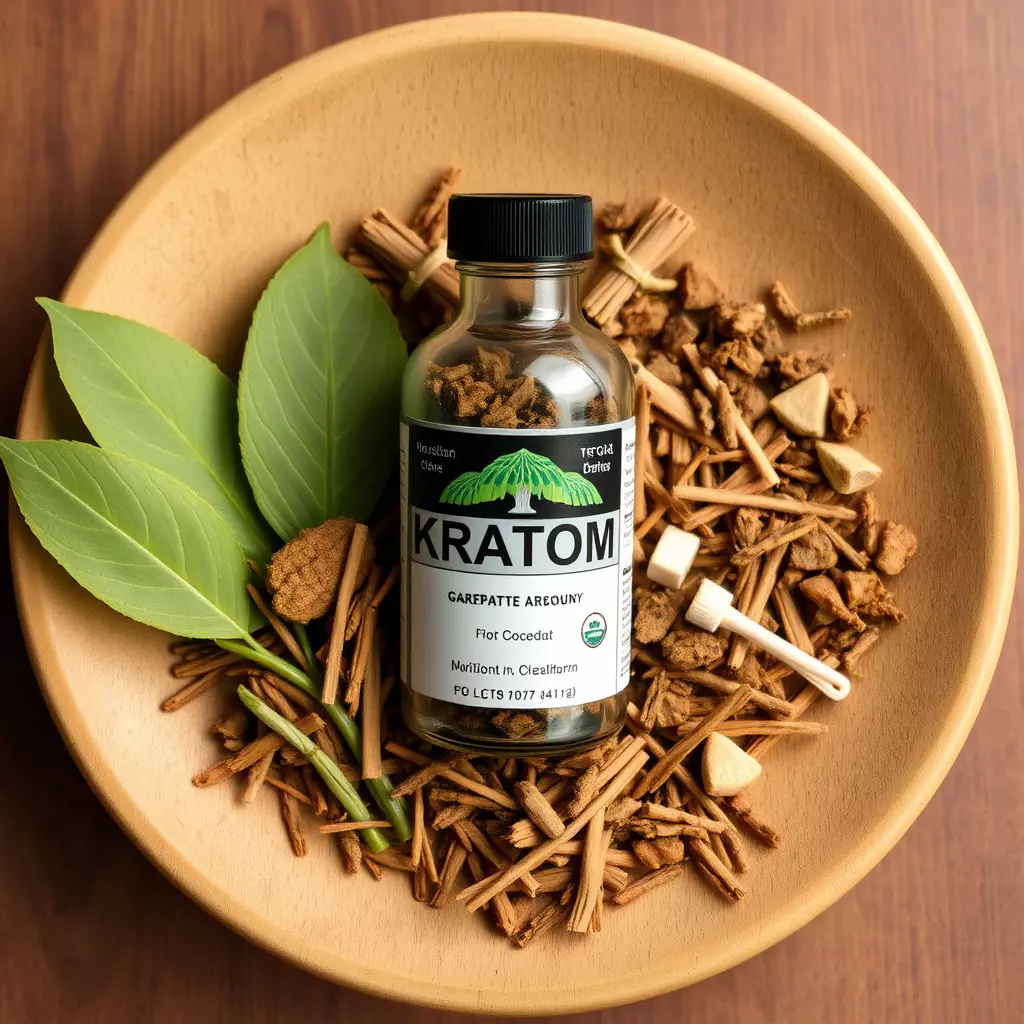Kratom, derived from Mitragyna speciosa, is currently a legal substance in Texas, offering potential relief for Chronic Fatigue Syndrome (CFS) sufferers through its alkaloids' interaction with opioid receptors. It's important to stay informed on the dynamic nature of kratom's legal status due to ongoing legislative discussions at both state and federal levels in Texas. For those considering kratom as part of their CFS treatment, safe dosing is essential, with a recommended starting point of 1-2 grams, up to a maximum of 5-8 grams per day, divided into multiple doses. Given the complexities of CFS and the varying effects of different kratom strains, consulting with healthcare providers for personalized guidance is crucial. Users should also be aware that kratom may have adverse effects and can interact with other medications, emphasizing the need for careful consideration and monitoring. A holistic approach to CFS management includes integrating kratom with lifestyle changes such as regular exercise, a balanced diet, stress management, and adequate sleep, all of which can complement conventional treatments and improve quality of life for patients. Regular evaluation of one's response to kratom is necessary to ensure it is safely and effectively used in the context of CFS management.
Chronic fatigue syndrome (CFS) presents a complex challenge for individuals and healthcare providers alike, often leaving patients seeking effective management strategies. Kratom, a botanical supplement derived from Mitragyna speciosa, has emerged as a potential aid in mitigating CFS symptoms. This article delves into the role of kratom in managing CFS, with a focus on its legal status in Texas—a critical aspect for those residing in or visiting this state. We explore how kratom’s effects can influence CFS symptomatology and offer safety considerations, dosage guidelines, and integrative management approaches tailored to the Texas context. Understanding the intricacies of kratom’s legality and its potential impact on CFS symptoms is essential for those navigating this condition’s debilitating effects.
- Navigating Chronic Fatigue Syndrome: The Role of Kratom in Management and Its Legal Status in Texas
- Understanding Kratom's Effects on Chronic Fatigue Syndrome Symptoms
- Safety Considerations, Dosage Guidelines, and Integrative Approaches to Managing CFS with Kratom in Texas
Navigating Chronic Fatigue Syndrome: The Role of Kratom in Management and Its Legal Status in Texas

Navigating Chronic Fatigue Syndrome (CFS) can be a complex and challenging journey for individuals affected by this condition. The search for effective management strategies often leads to exploring various treatments, including the use of kratom. Kratom, derived from the leaves of the Mitragyna speciosa tree native to Southeast Asia, has garnered attention for its potential therapeutic benefits. Proponents suggest that kratom may offer relief from the debilitating fatigue and pain associated with CFS due to its alkaloid profile, which can interact with opioid receptors in the brain. However, the use of kratom is not without regulatory considerations; it’s crucial for patients and caregivers to be aware of its legal status. In Texas, the legal landscape regarding kratom has evolved over time. As of the knowledge cutoff date, kratom is legal in Texas, but its status is subject to change due to ongoing legislative discussions and regulatory assessments. It’s imperative for individuals considering kratom as part of their CFS management plan to stay informed about the current laws governing its use within the state. This includes understanding both state and federal regulations, as well as the potential for legal changes that could impact access to this substance. Users should also be mindful of the potential side effects and interactions with other medications when incorporating kratom into their treatment regimen. Consulting healthcare professionals is essential to ensure safe and effective use of kratom in managing CFS symptoms.
Understanding Kratom's Effects on Chronic Fatigue Syndrome Symptoms

Kratom, a botanical derived from the leaves of Mitragyna speciosa, has garnered attention in various circles for its potential therapeutic properties. For individuals suffering from Chronic Fatigue Syndrome (CFS), the effects of kratom on symptom management have been a subject of interest and exploration. Kratom contains alkaloids such as mitragynine and 7-hydroxymitragynine, which are believed to interact with the brain’s opioid receptors, potentially offering relief from pain and fatigue. Users report that kratom can enhance energy levels and improve mood, which may be beneficial for CFS patients who struggle with pervasive fatigue and a host of other debilitating symptoms.
The legal status of kratom varies across different states within the United States, and as such, it’s important to understand its legality in your specific region. In Texas, the regulatory landscape is subject to change, so it’s crucial for individuals considering kratom as a management tool for CFS to stay informed on current laws. As of the knowledge cutoff date, kratom is legal in Texas but may be subject to regulations that dictate its sale and use. The effects of kratom can be quite nuanced, with different strains offering varying levels of stimulation or sedation, which can be a double-edged sword for CFS patients. Careful dose titration and monitoring of its effects are essential to optimize its benefits while minimizing potential adverse effects. Users should approach kratom with caution, seeking guidance from healthcare professionals who can provide personalized advice based on individual health profiles and the unique challenges posed by chronic fatigue syndrome.
Safety Considerations, Dosage Guidelines, and Integrative Approaches to Managing CFS with Kratom in Texas

For individuals in Texas considering the use of kratom for chronic fatigue syndrome (CFS) management, it’s crucial to first understand its legal status and safety considerations. As of the knowledge cutoff date, kratom is not a controlled substance in Texas under state law, making it an accessible option for those seeking alternative treatments. However, the legality of kratom can be subject to change, so it’s imperative to verify its current legal status at both the state and federal levels. When integrating kratom into a CFS management plan, dosage guidelines are paramount to ensure safety and efficacy. Typically, users start with a low dose, often around 1-2 grams, and gradually adjust as needed, up to a maximum of 5-8 grams per day, divided into doses to avoid adverse effects. It’s advisable to consult with a healthcare provider before beginning any new treatment regimen, particularly for individuals with co-occurring conditions or those on other medications.
Kratom’s alkaloids, mitragynine and 7-hydroxymitragynine, are believed to interact with the body’s opioid receptors, potentially offering pain relief and mood enhancement, which can be beneficial for CFS patients. An integrative approach to managing CFS with kratom involves a combination of lifestyle modifications, such as regular exercise, a balanced diet, stress management techniques, and adequate sleep hygiene, alongside the use of kratom. This holistic strategy aims to complement conventional medical treatments and improve overall quality of life for those suffering from CFS. It’s essential to monitor one’s response to kratom and adjust usage based on individual tolerance and effectiveness, always prioritizing safety and well-being in conjunction with professional healthcare guidance.
In conclusion, chronic fatigue syndrome presents a complex challenge for patients and healthcare providers alike. The exploration of kratom as an integrative approach within the management of CFS offers promise, particularly in mitigating its debilitating symptoms. While the legal status of kratom in Texas requires clear understanding—kratom is indeed legal at the state level—users must navigate its use with caution, adhering to safe dosage guidelines to avoid potential adverse effects. The therapeutic potential of kratom for those suffering from CFS warrants further research and clinical trials to elucidate its efficacy and long-term impact. As such, individuals considering kratom as part of their management strategy should consult with healthcare professionals to ensure a holistic and safe approach to managing this condition.






